人教新目标(Go for it)版七年级下Unit 2 What time do you go to school? Section B 2a-3b课件(共46张PPT)
文档属性
| 名称 | 人教新目标(Go for it)版七年级下Unit 2 What time do you go to school? Section B 2a-3b课件(共46张PPT) | 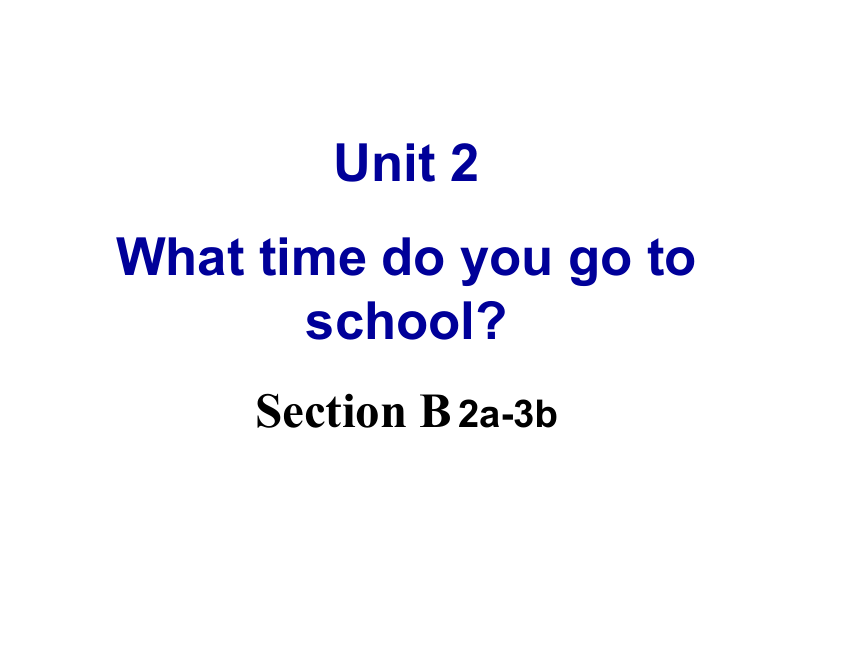 | |
| 格式 | pptx | ||
| 文件大小 | 1.8MB | ||
| 资源类型 | 教案 | ||
| 版本资源 | 人教新目标(Go for it)版 | ||
| 科目 | 英语 | ||
| 更新时间 | 2022-07-09 12:30:38 | ||
图片预览


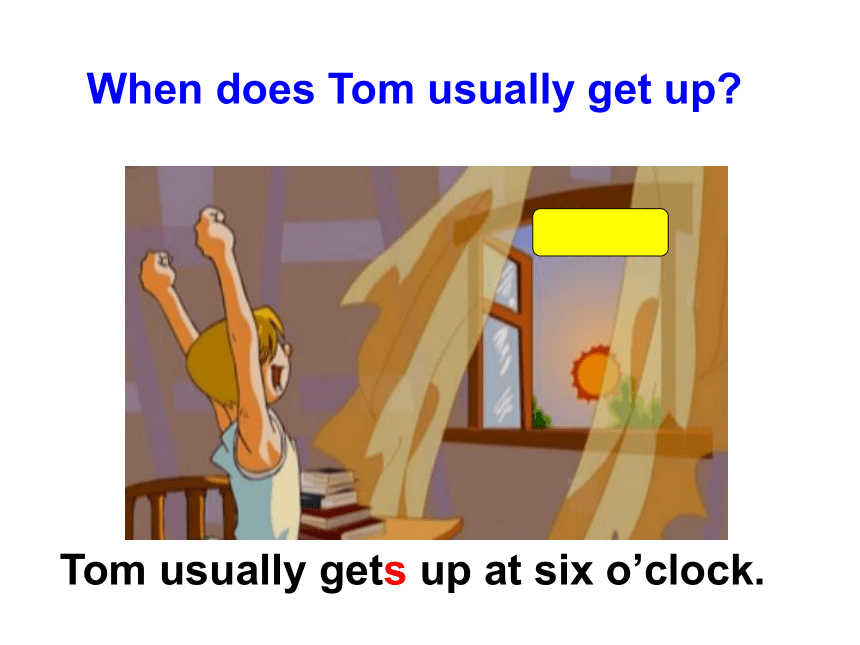
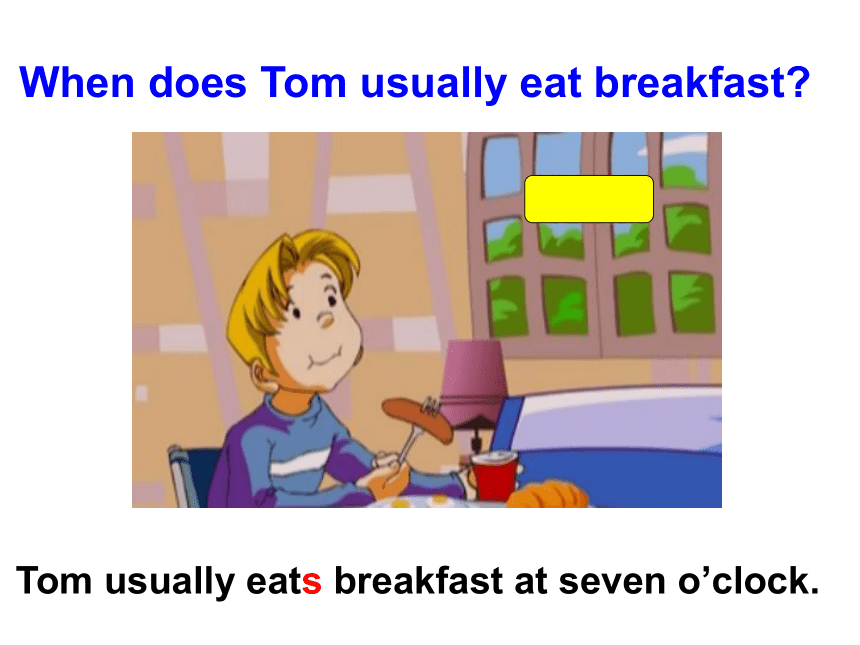
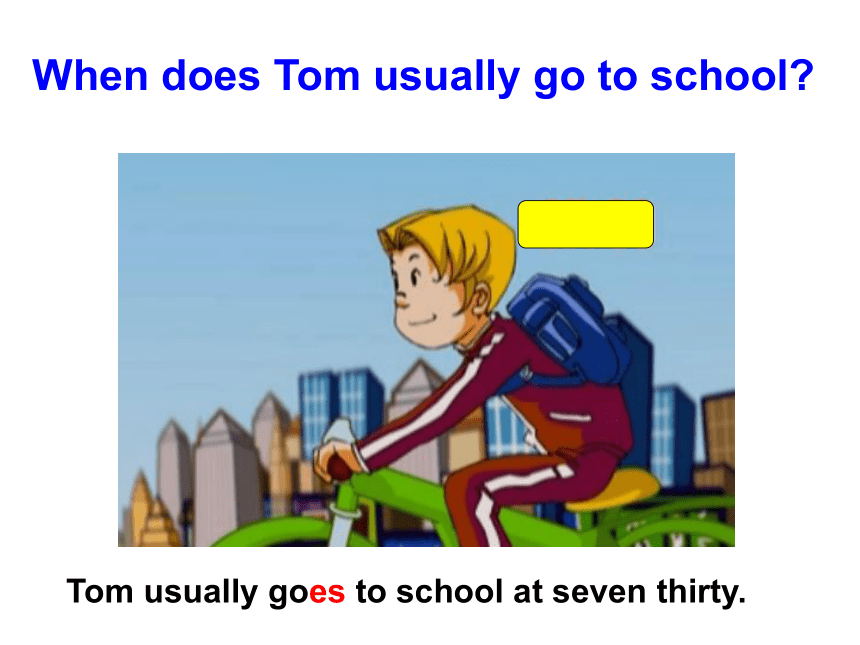
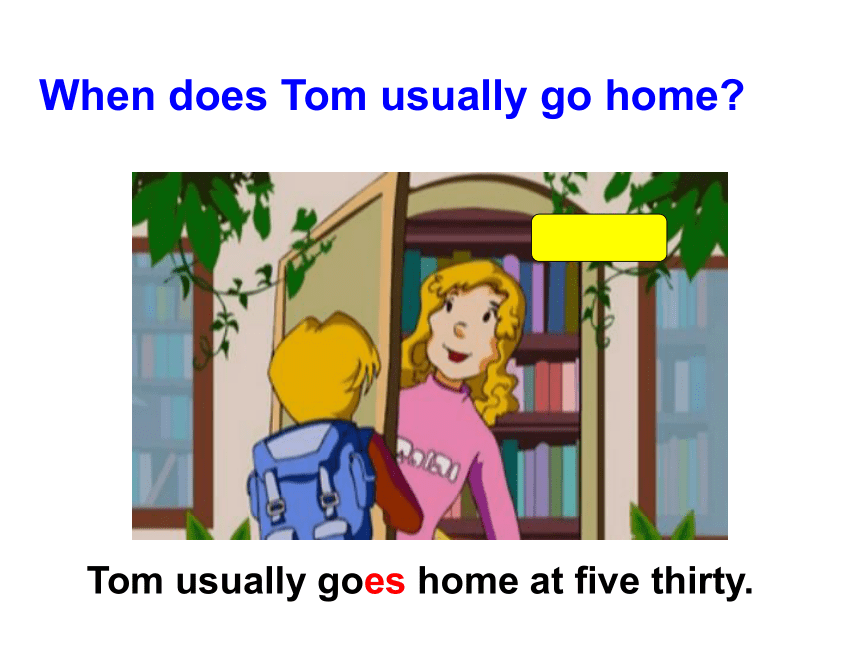
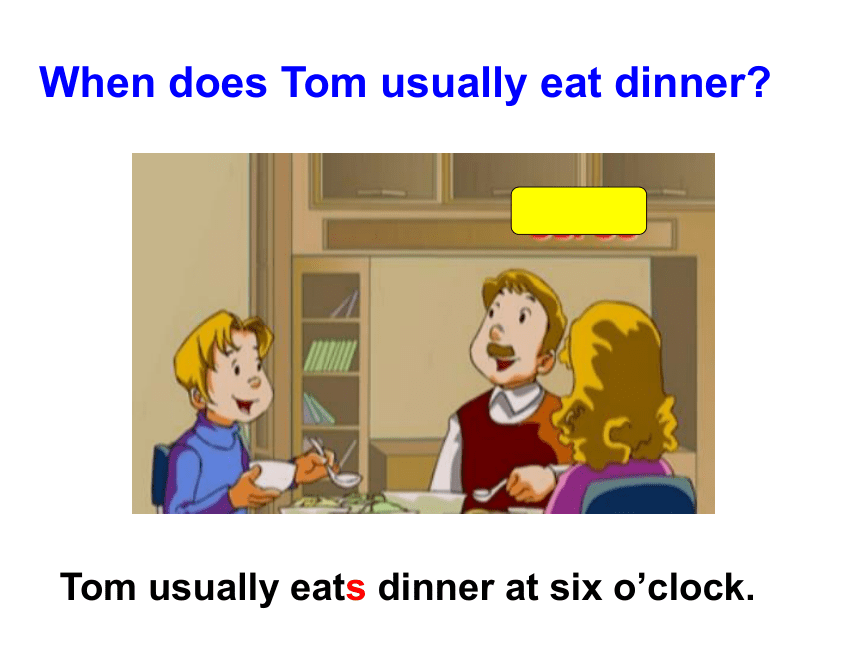
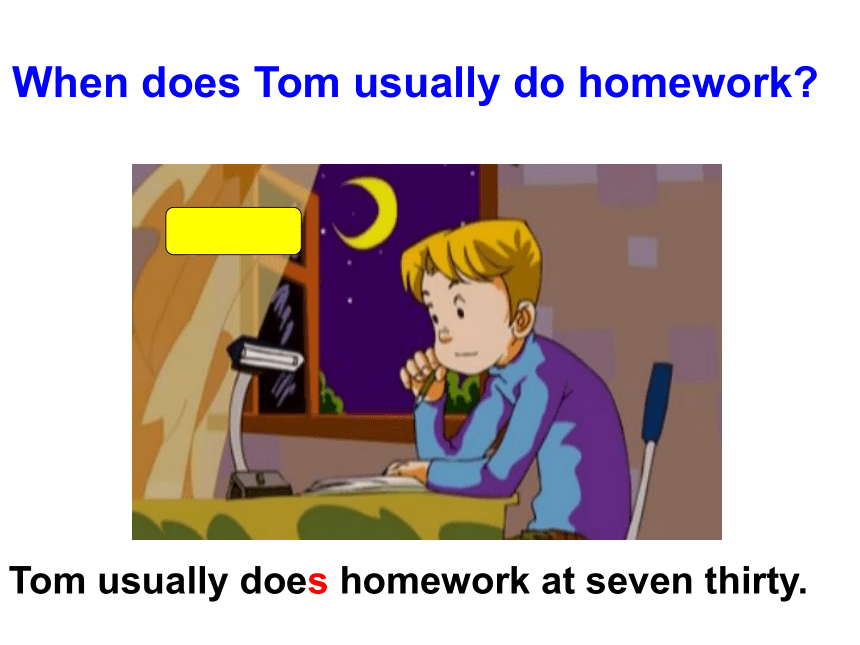
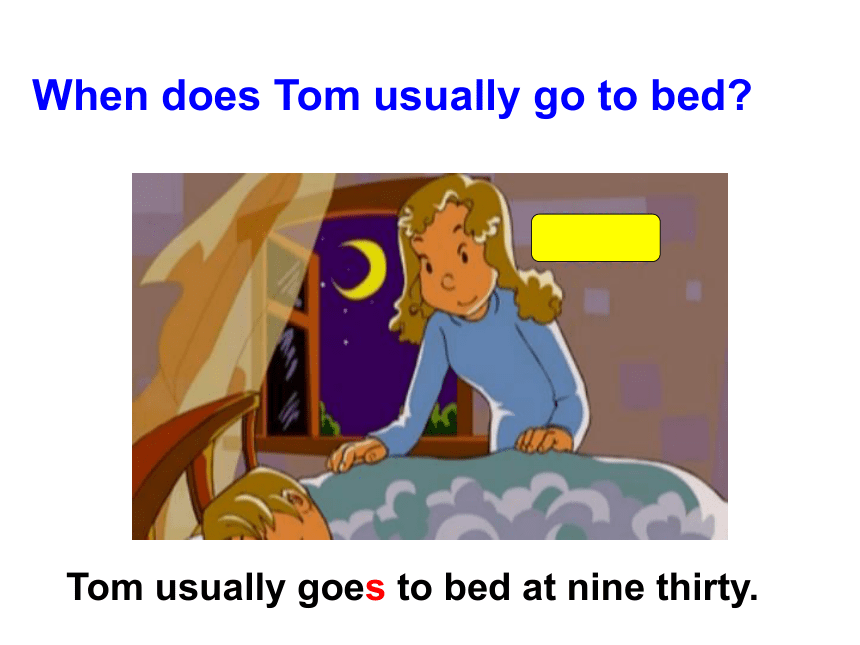
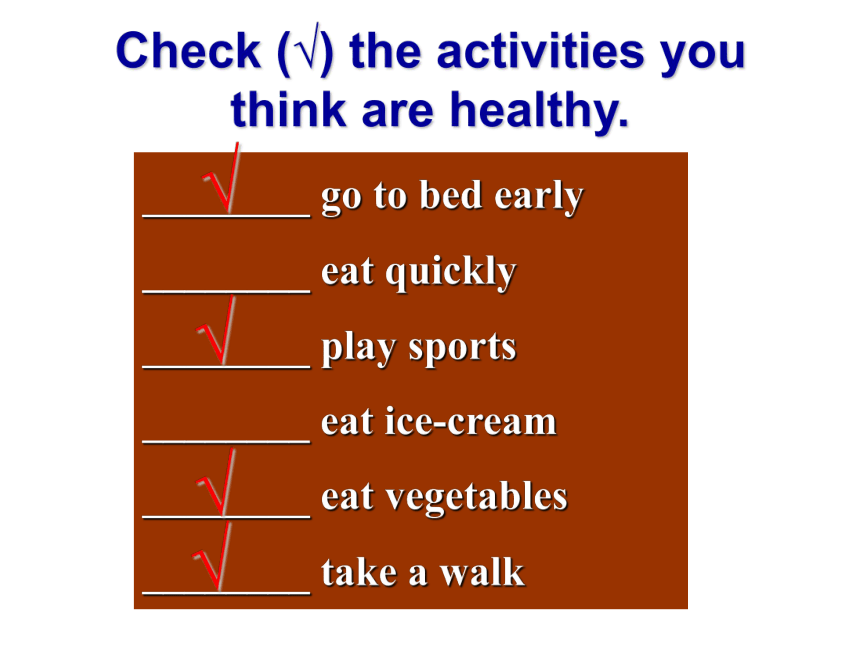
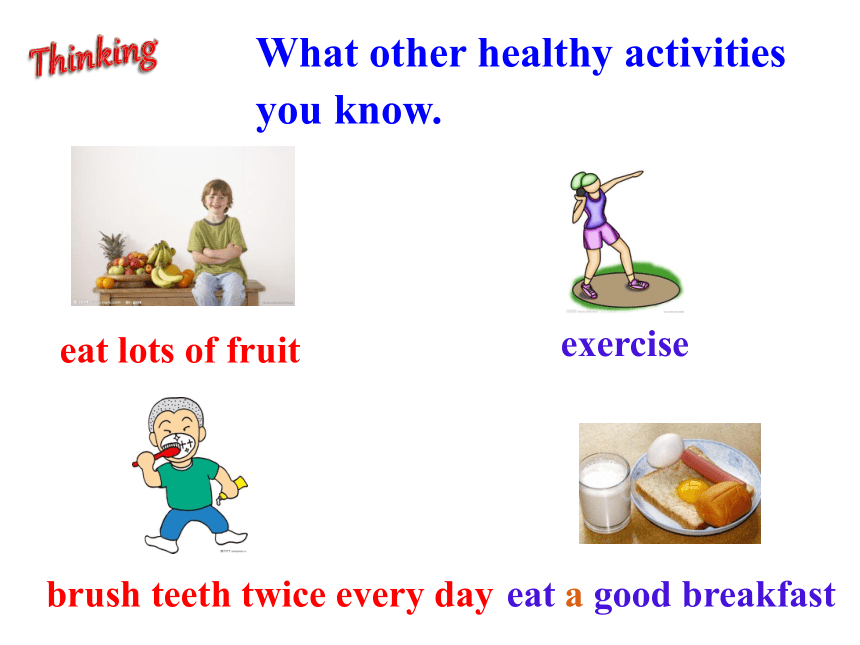
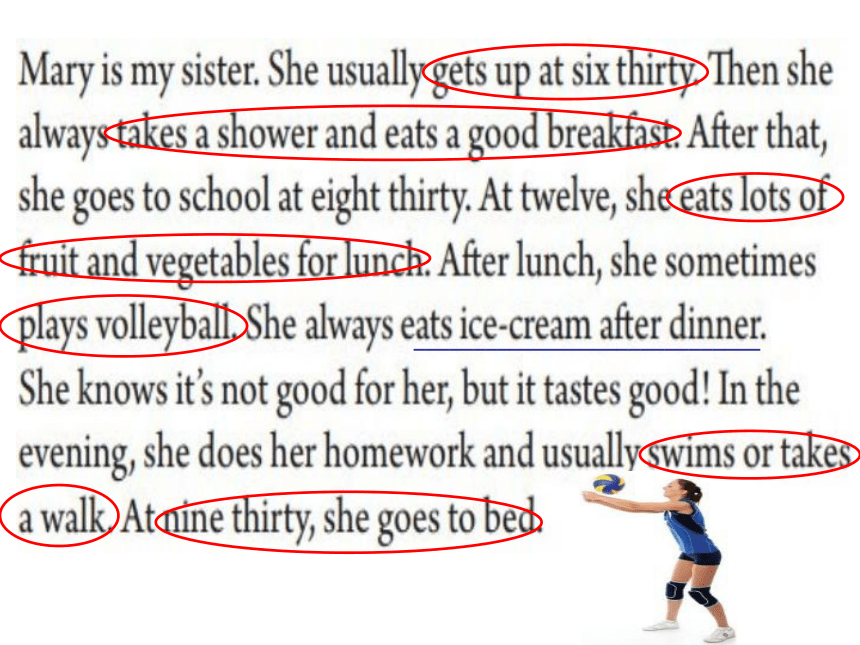
文档简介
(共46张PPT)
Unit 2
What time do you go to school
Section B 2a-3b
Tom
A Guessing game
When does Tom usually get up
Tom usually gets up at six o’clock.
When does Tom usually eat breakfast
Tom usually eats breakfast at seven o’clock.
When does Tom usually go to school
Tom usually goes to school at seven thirty.
When does Tom usually go home
Tom usually goes home at five thirty.
When does Tom usually eat dinner
Tom usually eats dinner at six o’clock.
When does Tom usually do homework
Tom usually does homework at seven thirty.
When does Tom usually go to bed
Tom usually goes to bed at nine thirty.
Check (√) the activities you think are healthy.
________ go to bed early
________ eat quickly
________ play sports
________ eat ice-cream
________ eat vegetables
________ take a walk
√
√
√
√
brush teeth twice every day
exercise
eat lots of fruit
Thinking
What other healthy activities
you know.
eat a good breakfast
_____________________________
Tony and Mary are brother and sister. They have healthy and unhealthy habits. Who is healthier
Number these sentences in order to make a story about a daily routine.
___ I usually exercise from six fifteen to seven.
___ I always get up early at six.
___ After that, I always brush my teeth and go to school at eight.
___ Then I quickly have a shower and eat breakfast.
___ I have lunch at a quarter to twelve.
___ I get home from school at half past four and do my homework.
___ I have a very healthy life.
___ I have dinner at seven thirty.
___ I go to bed at ten.
1
2
4
5
6
7
3
8
9
Number the pictures and make a common daily routine.
1
2
3
4
5
6
7
8
9
11
10
Talk about your daily routine.
I usually get up at seven o’clock.
I exercise…
Write about your own daily routine.
________________________________
_______________________________
_______________________________
_______________________________
_______________________________
_______________________________
________________________________
3b
写作指导:
回想一下上个环节中自己一天的作息。
按时间的先后,逐条叙述。
注意运用正确的英语表达方式:
I+ usually/often+动词短语+at+时间。
One possible version:
I have a healthy life. I usually get up at seven. I exercise from a quarter past seven to half past seven. Then I have breakfast and brush my teeth. I go to school at eight o’clock. I have lunch at twelve o’clock. I get home from school at half past four and do my homework. I have dinner at six then I watch TV. I go to bed at nine thirty.
Think about your weekends’ activities then fill in the blanks.
Activities Time
morning get up
exercise
eat breakfast
noon have lunch
afternoon play sports
meet friends
evening eat dinner
watch TV
go to bed
My weekends
Tell your classmates about your life on weekends.
I have a relaxing weekend. I usually get up at eight. Then I exercise for half an hour. I eat breakfast at nine. I brush my teeth at nine past twenty. I …
quickly意为“快速地”,是副词,修饰动词。
The dog runs quickly.
小狗快速地跑了。
Don’t eat quickly. It’s not a good habit.
别吃得太快,这不是个好习惯。
1. quickly的用法。
Language points
拓展:
quick adj. ,快的;迅速的。
Tom eats a quick breakfast, then goes to school.
汤姆快速吃完早饭,然后就去上学了。
Jack eats either hamburgers or sandwiches for lunch.
杰克或者吃汉堡或者吃三明治作午饭。
You can either play chess or play the guitar.
你可以下棋或者弹吉它。
2. either… or… 意为“或者……或者…… ” 连接两个并列名词、代词或句子成份。
当either…or…连接两个名词作主语时,谓语动词的时态和数应与最近的一个相匹配。
Either you or he is right.
不是你对就是他对。
3. lots of 与many, much的用法
这三个词都有“许多;大量”之意,但
用法不同。
1) lots of ,后面可以跟可数名词也可以跟
不可数名词。如:
He doesn’t have lots of (=many) books.
We have lots of (=much) work to do.
2) many与可数名词复数形式连用。如:
There are many apples in the basket.
篮子里有许多苹果。
3) much表示数量时,只能修饰不可数名词。如:
We don’t have much milk.
我没有很多牛奶了。
4. She knows it’s not good for her, but it tastes good!
1) be good for …表示“对……有益;对……有好处”;
be bad for…表示“对……有害;对……有坏处”。
It’s good for our health to go to bed early
and get up early.
早睡早起对我们的健康有好处。
Don’t read in the dark. It’s bad for your
eyes.
不要在暗处看书,这对你的眼睛有害。
Apples taste good. 苹果尝起来味道很好。
Does the ice-cream taste nice
冰淇淋的味道尝起来很好吗?
2) taste 意为“品尝 …… 的味道”。是连系动词,后面常跟形容词。
拓展:taste作名词,意为“味道”。
The ice-cream has a taste of lemon.
冰淇淋有点柠檬的味道。
Exercises
1. A: When does Jim ___ ___
B: He usually ____ up at
____ ____ ____.
2. A: When do your parents
_____ ___ _____
B: They usually _____the
room at __ ______ _____
eight in the ________.
一、看图补全对话。
get up
gets
half past six
clean the room
clean
a quarter past
6:30 AM
8:15 AM
morning
3. A: When does Jim
______________
B: He usually ____ his _________ at __ ______ __ eight in the _______.
4. A: When does Eric ____ _
____
B: He usually _____ a walk
at a _______ __ __ in the
_______.
do homework
does
a quarter to
take a
takes
quarter to six
7:45 PM
5:45 PM
evening
evening
homework
walk
Her mother gets up ____ five-thirty
every morning.
2. People usually eat breakfast ____ the
morning.
3. They will go swimming ____ four ____
the afternoon.
4. I play soccer ____ Sunday afternoon.
5. Her birthday party is _____ March 8th.
at
in
at
in
on
on
二、请用at, in 或 on 填空。
1. I get up at a______ 6:00.
2. School s______ at 7:40.
3. He goes to school ____ _____________
(大约) 7:00.
4. Do you want to _____ ______ (了解)
my morning
三、根据提示用合适的单词填空。
at around/about
know about
round
tarts
1. He eats breakfast at 6:20. (改为否定句)
2. I want to know about her hobbies.
(一般疑问句)
He doesn’t eat breakfast at 6:20.
Do you know about her hobbies
四、按要求改写句子。
3. I usually get up at 6:00 in the morning.
(就划线部分提问)
What time do you usually get up
五、根据中文提示完成句子:
1. 你通常什么时候洗澡
_____ _____ do you usually _____ a shower
2. 他通常什么时候去上学
______ ______ he usually ____ ____ _______
3. 她每天下午5点回家。
She ______ ______ _____ 5:00 ___ the
afternoon.
What time
take
When does
go to school
goes home at
in
4. 我父母通常早上8点钟去工作。
My parents usually _____ ____ work
____ 8 ____ the morning.
5. 我的小黑狗每天晚上9点睡觉。
My little black dog _____ ____ _____
at 9 every night.
6. 谢谢你的来信。
Thanks _____ _____ letter.
go to
at
in
goes to bed
for your
7. 我每天在7: 15吃早餐。
I eat breakfast at ___ ________ past seven.
8. 在大约8点钟我的小弟弟起床。
At ________ 8 ________ my little brother
_____ up.
9. 下学后, 我做作业。
______ school, I ____ ____________.
10. 在晚餐之前,我看电视。
_______ dinner, I ______ TV.
a quarter
around
o’clock
gets
After
do homework
Before
watch
B. 汉译英:
1. 起床__________________________
2. 在7点30分_____________________
3. 早餐__________________________
4. 在…旁边______________________
5. 去上学________________________
6. 上课__________________________
7. 课间休息______________________
8. 与我的朋友交谈_______________
9. 去游乐场______________________
10. 踢足球_______________________
get up
at half past seven
have breakfast
next to
go to school
have lessons
have a break
talk to my friends
go to the playground
play football
11. 吃午饭____________________
12. 在食堂____________________
13. 吃肉和大米________________
14. 回家______________________
15. 看电视____________________
16. 吃晚饭____________________
17. 做功课____________________
18. 上床睡觉__________________
19. 在上午____________________
20. 在下午___________________
21. 在晚上____________________
have lunch
in the dining hall
have meat and rice
go home
watch TV
have dinner
do one’s homework
go to bed
in the morning
in the afternoon
in the evening
1.谢谢你的帮助。
2.八点钟开始上课。
3.他父亲整夜工作。
Thanks for your help.
School starts at 8:00.
His father works all night.
六、翻译
4.我想去打篮球。
5.她每晚做家庭作业。
6.Mike经常把自己的学习情况告诉妈妈。
7.我想知道他的情况。
I want to know about him.
I want to play basketball.
She does her homework every evening.
Mike usually tells his mother
about his study.
Suppose you have a pen pal in the USA. Write something about your day to him/her.
Homework
写信开头用语:
Thank you for your letter.
Do you want to know about my…
结束语:
Please write and tell me about your…
Please write soon.
签名处: love/love from/Best wishes
Tom
Thank You!
Unit 2
What time do you go to school
Section B 2a-3b
Tom
A Guessing game
When does Tom usually get up
Tom usually gets up at six o’clock.
When does Tom usually eat breakfast
Tom usually eats breakfast at seven o’clock.
When does Tom usually go to school
Tom usually goes to school at seven thirty.
When does Tom usually go home
Tom usually goes home at five thirty.
When does Tom usually eat dinner
Tom usually eats dinner at six o’clock.
When does Tom usually do homework
Tom usually does homework at seven thirty.
When does Tom usually go to bed
Tom usually goes to bed at nine thirty.
Check (√) the activities you think are healthy.
________ go to bed early
________ eat quickly
________ play sports
________ eat ice-cream
________ eat vegetables
________ take a walk
√
√
√
√
brush teeth twice every day
exercise
eat lots of fruit
Thinking
What other healthy activities
you know.
eat a good breakfast
_____________________________
Tony and Mary are brother and sister. They have healthy and unhealthy habits. Who is healthier
Number these sentences in order to make a story about a daily routine.
___ I usually exercise from six fifteen to seven.
___ I always get up early at six.
___ After that, I always brush my teeth and go to school at eight.
___ Then I quickly have a shower and eat breakfast.
___ I have lunch at a quarter to twelve.
___ I get home from school at half past four and do my homework.
___ I have a very healthy life.
___ I have dinner at seven thirty.
___ I go to bed at ten.
1
2
4
5
6
7
3
8
9
Number the pictures and make a common daily routine.
1
2
3
4
5
6
7
8
9
11
10
Talk about your daily routine.
I usually get up at seven o’clock.
I exercise…
Write about your own daily routine.
________________________________
_______________________________
_______________________________
_______________________________
_______________________________
_______________________________
________________________________
3b
写作指导:
回想一下上个环节中自己一天的作息。
按时间的先后,逐条叙述。
注意运用正确的英语表达方式:
I+ usually/often+动词短语+at+时间。
One possible version:
I have a healthy life. I usually get up at seven. I exercise from a quarter past seven to half past seven. Then I have breakfast and brush my teeth. I go to school at eight o’clock. I have lunch at twelve o’clock. I get home from school at half past four and do my homework. I have dinner at six then I watch TV. I go to bed at nine thirty.
Think about your weekends’ activities then fill in the blanks.
Activities Time
morning get up
exercise
eat breakfast
noon have lunch
afternoon play sports
meet friends
evening eat dinner
watch TV
go to bed
My weekends
Tell your classmates about your life on weekends.
I have a relaxing weekend. I usually get up at eight. Then I exercise for half an hour. I eat breakfast at nine. I brush my teeth at nine past twenty. I …
quickly意为“快速地”,是副词,修饰动词。
The dog runs quickly.
小狗快速地跑了。
Don’t eat quickly. It’s not a good habit.
别吃得太快,这不是个好习惯。
1. quickly的用法。
Language points
拓展:
quick adj. ,快的;迅速的。
Tom eats a quick breakfast, then goes to school.
汤姆快速吃完早饭,然后就去上学了。
Jack eats either hamburgers or sandwiches for lunch.
杰克或者吃汉堡或者吃三明治作午饭。
You can either play chess or play the guitar.
你可以下棋或者弹吉它。
2. either… or… 意为“或者……或者…… ” 连接两个并列名词、代词或句子成份。
当either…or…连接两个名词作主语时,谓语动词的时态和数应与最近的一个相匹配。
Either you or he is right.
不是你对就是他对。
3. lots of 与many, much的用法
这三个词都有“许多;大量”之意,但
用法不同。
1) lots of ,后面可以跟可数名词也可以跟
不可数名词。如:
He doesn’t have lots of (=many) books.
We have lots of (=much) work to do.
2) many与可数名词复数形式连用。如:
There are many apples in the basket.
篮子里有许多苹果。
3) much表示数量时,只能修饰不可数名词。如:
We don’t have much milk.
我没有很多牛奶了。
4. She knows it’s not good for her, but it tastes good!
1) be good for …表示“对……有益;对……有好处”;
be bad for…表示“对……有害;对……有坏处”。
It’s good for our health to go to bed early
and get up early.
早睡早起对我们的健康有好处。
Don’t read in the dark. It’s bad for your
eyes.
不要在暗处看书,这对你的眼睛有害。
Apples taste good. 苹果尝起来味道很好。
Does the ice-cream taste nice
冰淇淋的味道尝起来很好吗?
2) taste 意为“品尝 …… 的味道”。是连系动词,后面常跟形容词。
拓展:taste作名词,意为“味道”。
The ice-cream has a taste of lemon.
冰淇淋有点柠檬的味道。
Exercises
1. A: When does Jim ___ ___
B: He usually ____ up at
____ ____ ____.
2. A: When do your parents
_____ ___ _____
B: They usually _____the
room at __ ______ _____
eight in the ________.
一、看图补全对话。
get up
gets
half past six
clean the room
clean
a quarter past
6:30 AM
8:15 AM
morning
3. A: When does Jim
______________
B: He usually ____ his _________ at __ ______ __ eight in the _______.
4. A: When does Eric ____ _
____
B: He usually _____ a walk
at a _______ __ __ in the
_______.
do homework
does
a quarter to
take a
takes
quarter to six
7:45 PM
5:45 PM
evening
evening
homework
walk
Her mother gets up ____ five-thirty
every morning.
2. People usually eat breakfast ____ the
morning.
3. They will go swimming ____ four ____
the afternoon.
4. I play soccer ____ Sunday afternoon.
5. Her birthday party is _____ March 8th.
at
in
at
in
on
on
二、请用at, in 或 on 填空。
1. I get up at a______ 6:00.
2. School s______ at 7:40.
3. He goes to school ____ _____________
(大约) 7:00.
4. Do you want to _____ ______ (了解)
my morning
三、根据提示用合适的单词填空。
at around/about
know about
round
tarts
1. He eats breakfast at 6:20. (改为否定句)
2. I want to know about her hobbies.
(一般疑问句)
He doesn’t eat breakfast at 6:20.
Do you know about her hobbies
四、按要求改写句子。
3. I usually get up at 6:00 in the morning.
(就划线部分提问)
What time do you usually get up
五、根据中文提示完成句子:
1. 你通常什么时候洗澡
_____ _____ do you usually _____ a shower
2. 他通常什么时候去上学
______ ______ he usually ____ ____ _______
3. 她每天下午5点回家。
She ______ ______ _____ 5:00 ___ the
afternoon.
What time
take
When does
go to school
goes home at
in
4. 我父母通常早上8点钟去工作。
My parents usually _____ ____ work
____ 8 ____ the morning.
5. 我的小黑狗每天晚上9点睡觉。
My little black dog _____ ____ _____
at 9 every night.
6. 谢谢你的来信。
Thanks _____ _____ letter.
go to
at
in
goes to bed
for your
7. 我每天在7: 15吃早餐。
I eat breakfast at ___ ________ past seven.
8. 在大约8点钟我的小弟弟起床。
At ________ 8 ________ my little brother
_____ up.
9. 下学后, 我做作业。
______ school, I ____ ____________.
10. 在晚餐之前,我看电视。
_______ dinner, I ______ TV.
a quarter
around
o’clock
gets
After
do homework
Before
watch
B. 汉译英:
1. 起床__________________________
2. 在7点30分_____________________
3. 早餐__________________________
4. 在…旁边______________________
5. 去上学________________________
6. 上课__________________________
7. 课间休息______________________
8. 与我的朋友交谈_______________
9. 去游乐场______________________
10. 踢足球_______________________
get up
at half past seven
have breakfast
next to
go to school
have lessons
have a break
talk to my friends
go to the playground
play football
11. 吃午饭____________________
12. 在食堂____________________
13. 吃肉和大米________________
14. 回家______________________
15. 看电视____________________
16. 吃晚饭____________________
17. 做功课____________________
18. 上床睡觉__________________
19. 在上午____________________
20. 在下午___________________
21. 在晚上____________________
have lunch
in the dining hall
have meat and rice
go home
watch TV
have dinner
do one’s homework
go to bed
in the morning
in the afternoon
in the evening
1.谢谢你的帮助。
2.八点钟开始上课。
3.他父亲整夜工作。
Thanks for your help.
School starts at 8:00.
His father works all night.
六、翻译
4.我想去打篮球。
5.她每晚做家庭作业。
6.Mike经常把自己的学习情况告诉妈妈。
7.我想知道他的情况。
I want to know about him.
I want to play basketball.
She does her homework every evening.
Mike usually tells his mother
about his study.
Suppose you have a pen pal in the USA. Write something about your day to him/her.
Homework
写信开头用语:
Thank you for your letter.
Do you want to know about my…
结束语:
Please write and tell me about your…
Please write soon.
签名处: love/love from/Best wishes
Tom
Thank You!
同课章节目录
- Unit 1 Can you play the guitar?
- Section A
- Section B
- Unit 2 What time do you go to school?
- Section A
- Section B
- Unit 3 How do you get to school?
- Section A
- Section B
- Unit 4 Don't eat in class.
- Section A
- Section B
- Unit 5 Why do you like pandas?
- Section A
- Section B
- Unit 6 I'm watching TV.
- Section A
- Section B
- Review of Units 1-6
- Unit 7 It's raining!
- Section A
- Section B
- Unit 8 Is there a post office near here?
- Section A
- Section B
- Unit 9 What does he look like?
- Section A
- Section B
- Unit 10 I'd like some noodles.
- Section A
- Section B
- Unit 11 How was your school trip?
- Section A
- Section B
- Unit 12 What did you do last weekend?
- Section A
- Section B
